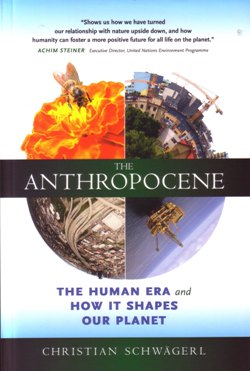 There is considerable interest in whether the time, and the changing environmental conditions, are right for the recognition of a new geological epoch, the Anthropocene. The term is attributed to Paul Crutzen and Eugene Stoermer in 2000 to denote the present time interval, in which many geologically significant conditions and processes are profoundly altered by human activities. A Working Group of the Subcommission on Quaternary Stratigraphy is in session, and there is support for the start of the Anthropocene to be at c. 1800, around the beginning of the Industrial Revolution in Europe.
There is considerable interest in whether the time, and the changing environmental conditions, are right for the recognition of a new geological epoch, the Anthropocene. The term is attributed to Paul Crutzen and Eugene Stoermer in 2000 to denote the present time interval, in which many geologically significant conditions and processes are profoundly altered by human activities. A Working Group of the Subcommission on Quaternary Stratigraphy is in session, and there is support for the start of the Anthropocene to be at c. 1800, around the beginning of the Industrial Revolution in Europe.
For geologists this is all very new. We are used to epochs representing periods of time in the geological record, traditionally between marked changes in fossil assemblages, or radioisotopically defined key events. Epochs are historic temporal units as we try and understand the history of the Earth, and yet the Anthropocene is a man-made period in which we have modified the environment. It is not yet clear what changes will result, and enthusiasm for the Anthropocence is linked at least in part to whether the recognition of a new geological epoch will change the way we relate to the planet, and our responsibility to it. The changes in behaviour are much needed, but they are needed irrespective of whether the Anthropocene becomes a geological epoch or not.
Into this debate Christian Schwägerl has launched an engaging, impressively well referenced and highly positive book. He is a science and environmental journalist interested in the interactions between humans, nature, and technology. Inspired by the idea that we are living in a new geological epoch, he addresses what it might mean to live in the Anthropocene. The book starts with the life of Paul Crutzen, his ideas and the impact they have had, and it ends with a conversation with him in the author’s kitchen. It is built in part on arresting snippets of information: the site of the Iron Curtain has evolved into an impromptu green belt 12,500 km in length, and currently the CO2 emissions associated with making a litre of milk are equivalent to burning a third of a litre of oil.
But these are brought together to address major issues around the relationship of technosphere to the biosphere, and how they are increasingly interlinked. Cities have to function like nature, technology needs to be a symbiont of the Earth system, and not an opponent, and bioadaption could be the new paradigm of technological development. Anthropogenetic ecosystems are being developed, at their most extreme in hospitals, and perhaps we have moved to a time when evolution is no longer blind, where it is shaped to some extent by conscious changes implemented by us.
In part we still carry the legacy of Descartes who considered organisms to be machines, helped divide the sciences from the humanities, and encouraged reductionism. Others, such as Von Humbolt in the 19th Century, envisaged equal wealth across the globe, and not the subjugation of nature but the use of its principles. Economy and ecology derive from the same Greek root, and yet too often they are regarded as opposites. The economy will become ecology in the Anthropocene because without the services of the oceans, forests, climate and water, a sustainable economy is not possible anywhere in the world. Functioning ecosystems will need to be ascribed their own economic value so that they appear on the positive side of company or government balance sheets, and that has to happen now, not when they are destroyed.
The failure of world leaders at the UN Climate Change conference in Copenhagen in 2009 indicates that solutions should be created from “below”, rather than waiting for solutions from above. What would happen if 7 billion people had my lifestyle? A scenario is developed for one way in which change might come about, including the declaration that the effects of human change have been sufficiently great for a new geological epoch, the Anthropocene, to be identified. Change, in this scenario, is driven initially by people in China and North America and it spills over into different power groups and different countries. Like the book, the scenario is thought provoking, positive and well argued. This engaging book deserves to be widely read.
Reviewed by Chris Hawkesworth
The Anthropocene - The Human Era and how it Shapes our Planet by Christian Schwägerl Synergetic Press (2015) 234pp £16.99 ISBN-978-0-907791-55-3